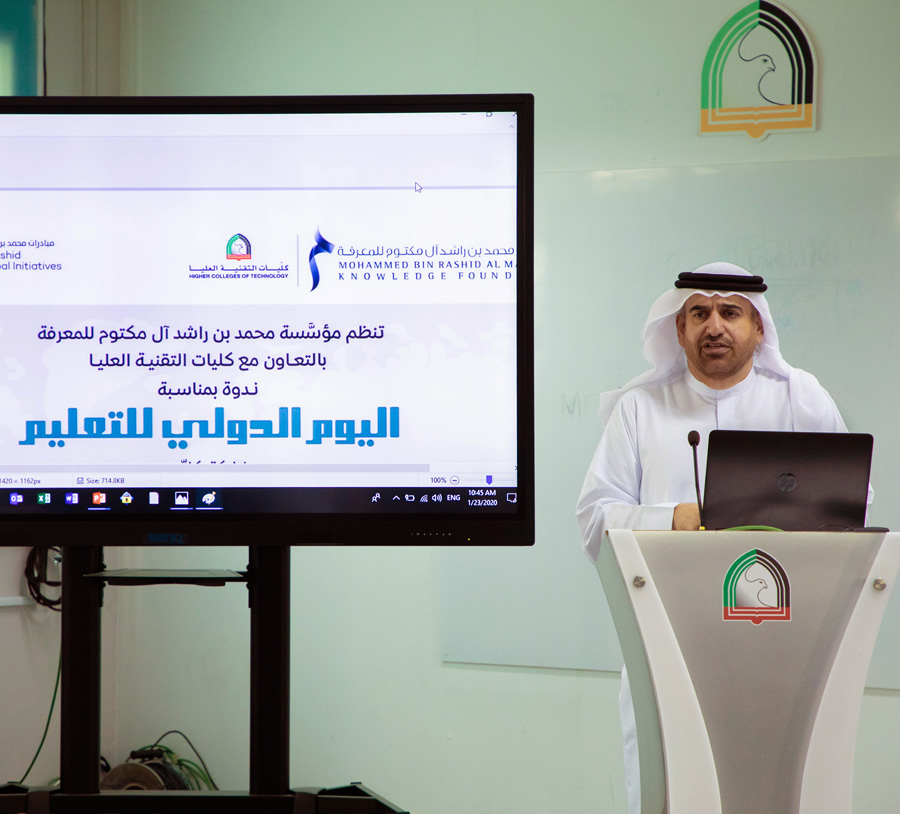Mohammed bin Rashid Al Maktoum Knowledge Foundation Launches ‘Digital Knowledge Hub’ to Promote Self-Education
The Mohammed bin Rashid Al Maktoum Knowledge Foundation (MBRF) has launched the ‘Digital Knowledge Hub’ – a comprehensive online platform to facilitate self-education and promote development – following the directives of MBRF Chairman His Highness Sheikh Ahmed bin Mohammed bin Rashid Al Maktoum.
Launched on the occasion of the United Nations’ International Day of Education on January 24, at a seminar held at the Mohammed bin Rashid Al Maktoum Knowledge Foundation Hall at the Higher Colleges of Technology (HCT) - Dubai Men’s College, the platform meets the needs of school and university students, as well as researchers and experts in all disciplines. It provides a wealth of high-quality, reliable information that can be used in educational processes.
His Excellency Jamal bin Huwaireb, CEO of MBRF, spoke at the seminar, along with Dr Hany Torky, Chief Technical Advisor of the Knowledge Project at the United Nations Development Programme (UNDP), and Dr Khaled Mohamed, Director of DDL & Digital Content.
“Education is the leading accelerator for sustainable solutions,” H.E. bin Huwaireb asserted. “Providing comprehensive, high-quality, and fair access to education for everyone, coupled with integrating sustainability principles into curricula at academic institutions, allows us to more effectively address global challenges in various sectors.”
“Education is a critical component in our Foundation’s strategies and plans, which, in turn, are in line with the vision of the UAE and its wise leadership to prioritise education as a primary means to develop human capital and establish a robust knowledge economy,” H.E. added, citing some of MBRF’s most prominent projects to support education, namely, the Digital Knowledge Hub, the Literacy Challenge, and the Global Knowledge Index, among others.
Meanwhile, Dr Khaled Mohamed showcased the Digital Knowledge Hub platform, explaining that it provides vast and diverse information resources, acting as a full-fledged and integrated platform for knowledge. Home to over 2.5 million items of digital content and a quarter of a million titles in several languages, the platform promotes reading with an intuitive interface and 15 specialised digital libraries offering material on space, history, and artificial intelligence, among other topics.
“The Digital Knowledge Hub provides access to all of MBRF’s publications, issued to spread knowledge, fill the digital gap in the Arab world, and serve as an optimised platform for building custom digital repositories for organisations,” Dr Mohamed noted. “It is the first integrated Arabic programming platform, which serves to develop the programming and digital systems market in the Arab region, allowing establishments to build their digital repositories. This, in turn, adheres to international standards and helps support the knowledge and education sectors of the future all around the world.”
For his part, Dr Hany Torky discussed the education sector and its connection to knowledge and the Global Knowledge Index. “The United Nations’ Sustainable Development Goals (SDGs) prioritise quality education for everyone,” he said. “They emphasise the importance of lifelong learning as a true accelerator transforming students from mere degree holders to professionals with remarkable qualifications and skills, relevant to the labour market.”
Dr Torky noted that statistics from the United Nations Educational, Scientific, and Cultural Organisation (UNESCO) reveal that there are 617 million children and teenagers around the world who cannot read, write, or do simple mathematics. Furthermore, nearly 50% of school-aged children in conflict zones do not attend schools; overall, there are 258 million children and youths who do not attend any formal schooling.
Dr Torky went on to showcase findings from the Global Knowledge Index, covering pre-university education, as well as technical and vocational education and training, and higher education. Switzerland, Finland, the United States of America, Singapore, and Luxembourg took the top five spots on the Index, he noted, adding that the UAE came in 19th place in the higher education sector in the Global Knowledge Index.








